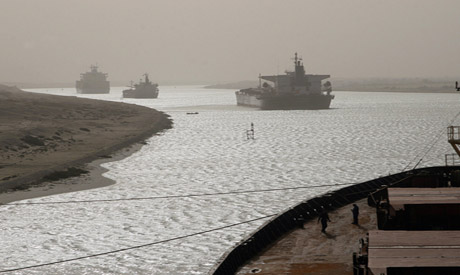
Disturbance at SUMED port would have a bigger impact on oil and shipping markets than a shutdown of the canal itself
Workers at Arab Petroleum Pipelines Company (SUMED), operator of the Suez to Mediterranean pipeline, have resumed their campaign for equal employment rights after months of calm.
The morning shift of 60 employees, from a total sub-contracted payroll of 230, held protests on Sunday at the SUMED terminal, located south of El Sukhna port on the Red Sea.
Worker demands spring from their ambiguous employment position. Though they are workers for SUMED, they are actually employed with
Maridive via temporary contracts -- a situation that has lasted, in the case of some workers, for more than 30 years.
"Our demand is to get the same rights as the permanent workers, as stipulated by article 79 of the labour law ," says Atef El-Sayed Mohamed, head of the independent union whose workers are contracted to Maridive.
According to article 79, if an employer entrusts another firm to carry out work in its own workspace, then the firm must ensure employment conditions for the latter company's own workers and those sub-contracted are equal.
Workers contracted to Mardive began protests immediately after Mubarak's ousting in February, leading to an eventual agreement between them and the administration
An agreement was concluded between the contracted workers and SUMED administration in the presence of representatives of the military, assuring the employees they will continue working when SUMED launches its new tender offer -- whichever company it eventually contracts.
Employees' anger increased recently when they discovered that the new sub-contractor won’t raise their salaries as much as they were expecting.
The administration’s decision on Sunday, to move Atef El-Sayed, head of the union they formed after the revolution, to SUMED premises in Alexandria increased their discontent.
After hearing the decision, morning shift workers started protesting at the Ain Sokhna port, bringing a rapid response from the maritime unit of the army. Workers claimed forces tried to disperse their protests.
The situation with SUMED employees is relatively unusual, in that many of the subcontracted workers are skilled labourers.
"Security workers have contracts while workers at the port don’t have. A marine chief, risking his life to do the work in the middle of storms or whatever the weather situation is, gets LE1,600 per month after 34 years of work, while the security guard gets LE,4000”, union head Atef El-Sayed Mohamed explained.
Though the SUMED strike is limited in scope, it could potentially have a larger economic impact.
Some analysts believe that a disturbance at the port might have a bigger effect on oil and shipping markets than a shutdown of the canal itself.
SUMED mainly controls the route for crude oil from the Arab Gulf to be transported to refining centres in the West. The Suez to Mediterranean pipeline has a carrying capacity of 2.5 million barrels.
SUMED serves the largest oil tankers unable to navigate the Suez Canal fully loaded. They send part of their cargo via the pipeline at the canal’s Red Sea entrance and then re-load the oil at the Mediterranean end.
SUMED is a joint venture of Egyptian General Petroleum CORP (50 per cent), Saudi Aramco (15 per cent), International Petroleum Investment Co., Abu Dhabi (15 per cent), three Kuwaiti companies (15 per cent) and Qatar Petroleum (5 per cent).
Short link: